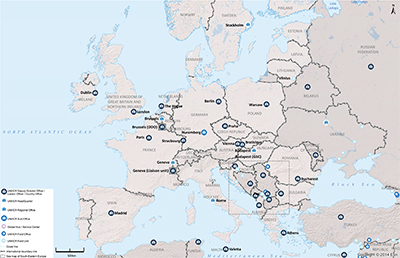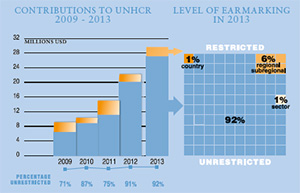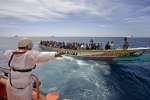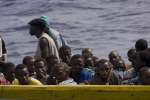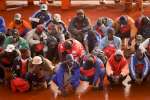2015 UNHCR subregional operations profile - Northern, Western, Central and Southern Europe
| Overview |
The number of asylum applications received in 2014 in European Union (EU) Member States has risen by 25 per cent compared to the same period in 2013. A quarter of the applicants are of Afghan, Eritrean or Syrian origin, and a similar proportion are under 18 years of age. There have also been many more asylum applications from stateless people, with an estimated total of 436,000 people across the European Union. Germany continues to be the recipient of the largest number of asylum applications, followed by France, Sweden, Italy and the United Kingdom.
In the first seven months of 2014, more than 87,000 people arrived in Italy by sea, mainly from Eritrea and the Syrian Arab Republic (Syria). In an effort to reduce the risks linked to such journeys, in October 2013 the Italian Government launched the Mare Nostrum operation, which has rescued more than 100,000 people. Greece and Spain also recorded an increase in arrivals.
The economic situation in the region has had an impact on the capacity and readiness of many countries to strengthen their protection systems. Austerity measures have also hit civil-society organizations that provide services to asylum-seekers and refugees. Xenophobia and intolerance have led to incidents of discrimination and violence. States have responded by concentrating on curbing irregular movements, including through tighter border controls and detention, or penalization for illegal entry.
UNHCR will build on international and regional law and policy to support States' efforts to find durable solutions for unaccompanied and separated children, who have been arriving in the subregion in large numbers.
The Office continues to be particularly concerned about reports that some EU countries are placing barriers to entry or forcibly returning asylum-seekers and refugees.
In April 2014, the European Union adopted the Asylum, Migration and Integration Fund, representing a commitment of over EUR 3 billion for the next seven years (2014-2020). A major portion of this fund will be allocated to Member States' national programmes to complement their own domestic budgets, which should help improve asylum systems, reception modalities, and integration policies.
In this context, UNHCR's work in the subregion will also focus on:
-
Assisting and supporting governments to build and maintain fair and efficient asylum and protection systems;
-
Ensuring border management is more protection-sensitive. The Office will promote alternatives to detention. It will also advocate for reception conditions that meet minimum international standards;
-
Promoting responsibility-sharing among EU Member States, complementing the efforts of the European Commission and the European Asylum Support Office (EASO);
-
Promoting community participation and preventing and responding to incidents of sexual and gender-based violence(SGBV);
-
Advocating for more resettlement places and enhancing integration capacity in resettlement countries;
-
Urging States to accede to the 1954 and 1961 UN Statelessness Conventions, improving mechanisms to identify and protect stateless people and preventing and resolving situations of statelessness; and
-
Supporting EU policy-making processes related to people of concern and mobilizing regional political and financial support for UNHCR's work worldwide.
| Response and implementation |
Asylum and protection
In 2015, one of UNHCR's priorities will be to ensure the safeguarding of asylum space. To prevent deaths at sea, the organization will work with European States towards more concerted action. These efforts will be guided by its Central Mediterranean Sea Initiative (CMSI), which includes measures not only within the European Union, but also in transit or first asylum countries, and in countries of origin. The CMSI seeks to strengthen cooperation with relevant stakeholders. Admission practices will be monitored and the capacity of immigration and coast guard officials built, to help prevent refoulement and ensure that those in need of international protection can access territory.
UNHCR offices in Bulgaria, Hungary, Poland, Romania, Slovakia and the United Kingdom will follow up on measures in respect of the Response to Vulnerability project. Standard operating procedures will be instituted in reception centres to respond to incidents of SGBV.
The Office will pursue efforts to build and maintain an effective asylum and protection system. Since 2013, UNHCR and the Government of Albania have worked in close collaboration to ensure the safe arrival of more than 240 former residents of the Hurriya temporary transit location (ex-Ashraf) in Iraq who are in need of international protection, and will continue working on durable solutions for this refugee group.
UNHCR will also work to assure reception conditions and procedures that are adequate for responding to asylum-seekers' specific needs and maintaining their dignity. UNHCR and UNICEF are developing guidance on how States can ensure respect for the best interests of unaccompanied children in Europe.
In line with the organization's global Beyond Detention strategy, rolled out in Hungary, Lithuania, Malta and the United Kingdom, the Office will promote alternatives to detention, as well as the release of children held and improvements in detention conditions.
Monitoring and reporting on national practices will help identify gaps and good practice. The follow-up study to Beyond Proof, which assesses credibility in claims lodged by unaccompanied children, will be completed in 2014 and will require implementation in 2015.
Having analysed the reasons for their movements, UNHCR has started developing a more comprehensive protection strategy for Afghans.
Comments on legislation in the context of the transposition of the asylum acquis, comparative analyses and judicial engagement, will allow UNHCR to contribute to the setting of national and regional legal standards. It will implement quality audit mechanisms and participate in some national asylum procedures, such as those in France, Italy and Spain.
UNHCR will continue to complement EASO's efforts to improve practical cooperation among EU Member States in building asylum systems and improving the quality of country-of-origin information.
The Office will pursue its efforts to identify cases for judicial engagement with national and European courts. It will continue to support the conference of refugee law judges in Germany. Judicial engagement and court interventions will permit UNHCR to ensure the correct application of relevant laws in refugee cases.
UNHCR works closely with civil-society organizations and others involved in refugee protection. Innovative approaches include high-visibility campaigns in public spaces and transport. In 2015, particular attention will be paid to improving social media communication.
Durable solutions
Despite 22 out of 36 countries contributing to UNHCR's resettlement efforts in some capacity, the number of resettlement places for the region remain limited. Special attention will be devoted to resettlement and humanitarian admission of Syrian refugees, and the Office will continue managing the Emergency Transit Centres in Timisoara (Romania) and Humenné (Slovakia).
In order to enhance reception and integration capacities and improve refugees' local integration prospects, the Office will work to raise awareness of the integration challenges facing 1.6 million refugees in the region and to promote good practice in labour market integration, housing and the building of social and professional networks.
Statelessness
UNHCR has launched a 10-year campaign to end statelessness, and will advocate for more EU Member States to accede to the 1954 and 1961 UN Statelessness Conventions. The organization will encourage and support States to adopt national action plans to address statelessness, conduct public awareness activities and advocate for a formal identification and protection mechanism for stateless people be established in countries that lack one.
The Office will continue to advocate for law reform preventing statelessness at birth or later in life, and the facilitation of naturalization. Cooperation with the European Network on Statelessness will continue.
| Financial information |
The budget for the subregion has increased significantly in the past years, from USD 51.1 million in 2011 to USD 68.1 million in 2015, primarily owing to the impact of the Syria Situation and asylum-seekers arriving by boat to the shores of Southern Europe.
The budget for the subregion will however be reduced during the course of 2015 as the operation in Albania will move to South-Eastern Europe within the context of UNHCR's regionalization process in the western Balkans.
Approximately 94 per cent of the 2015 budget is allocated to refugee programmes, with the remaining 6 per cent for statelessness activities.
| UNHCR 2015 budgets for Northern, Western, Central and Southern Europe (USD) | |||||
|---|---|---|---|---|---|
| Operation | 2014 Revised budget (as of 30 June 2014) |
2015 | |||
| Refugee programme PILLAR 1 |
Stateless programme PILLAR 2 |
Reintegration projects PILLAR 3 |
Total | ||
| Total | 68,075,927 | 62,431,037 | 4,479,646 | 1,191,163 | 68,101,847 |
| 1. Includes activities in Austria, France, Germany, Ireland, the Netherlands, the Liaison Office in Switzerland and the United Kingdom. 2. Includes activities in Bulgaria, the Czech Republic, Poland, Romania, Slovakia, Slovenia and as from 2015, also Croatia. 3. Includes activities in Albania, Cyprus, Greece, Malta and Spain. 4. Includes activities in Denmark, Estonia, Finland, Iceland, Latvia, Lithuania and Norway. |
|||||
| Belgium Regional Office[1] | 14,521,916 | 14,603,538 | 1,431,980 | 0 | 16,035,518 |
| Hungary Regional Office[2] | 17,069,083 | 11,993,641 | 1,702,007 | 1,191,163 | 14,886,811 |
| Italy Regional Office[3] | 24,976,188 | 22,677,175 | 223,092 | 0 | 22,900,267 |
| Sweden Regional Office[4] | 5,538,754 | 4,518,289 | 965,440 | 0 | 5,483,728 |
| Regional Activities | 5,969,986 | 8,638,394 | 157,127 | 0 | 8,795,521 |
Source: UNHCR Global Appeal 2015 Update
UNHCR contact information
| The UNHCR Representative in Spain | |||||||||||||||
|---|---|---|---|---|---|---|---|---|---|---|---|---|---|---|---|
| Style of Address | The UNHCR Representative in Spain | ||||||||||||||
| Street Address | Avda. General Perón, 32 ¿ 2nd floor, 28020 Madrid, SPAIN, Spain | ||||||||||||||
| Mailing Address | Spain | ||||||||||||||
| Telephone | +34 91 556 35 03 | ||||||||||||||
| Facsimile | +34 91 555 18 45 | ||||||||||||||
| Website | http://www.acnur.es | ||||||||||||||
| spama@unhcr.org | |||||||||||||||
| Time Zone | GMT + 1 | ||||||||||||||
| Working Hours |
|
||||||||||||||
| Public Holidays | 01 January 2015, New Year's Day 06 January 2015, Epiphany 02 April 2015, Maundy Thursday 03 April 2015, Good Friday 01 May 2015, Labour Day 17 July 2015, Eid Al-Fitr 25 September 2015, Eid Al-Adha 12 October 2015, National Day 08 December 2015, Immaculate Conception 25 December 2015, Christmas Day |
||||||||||||||

